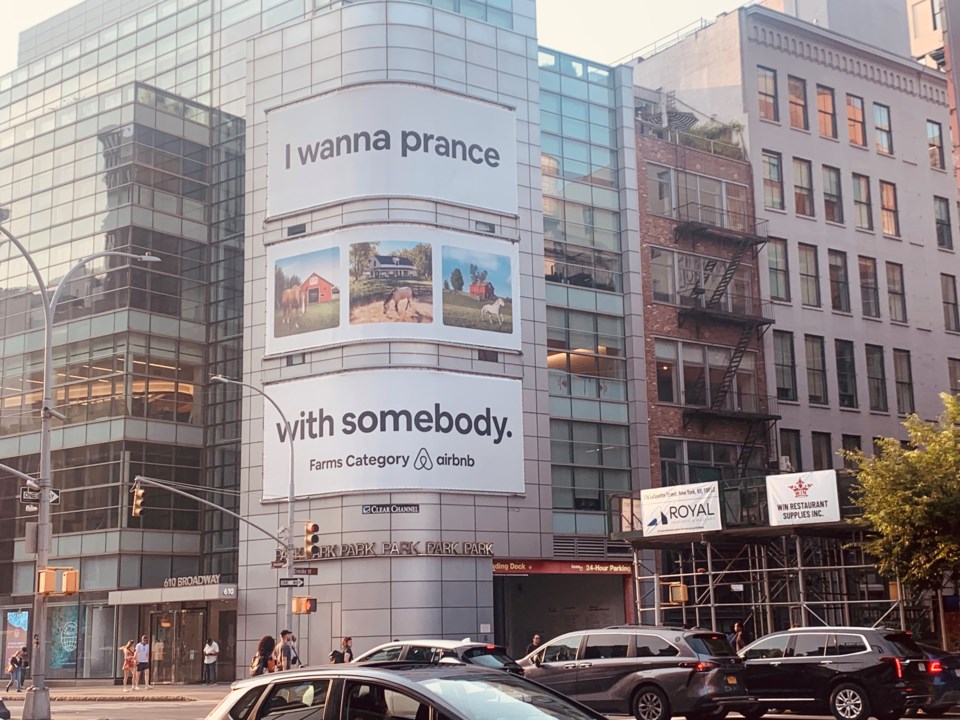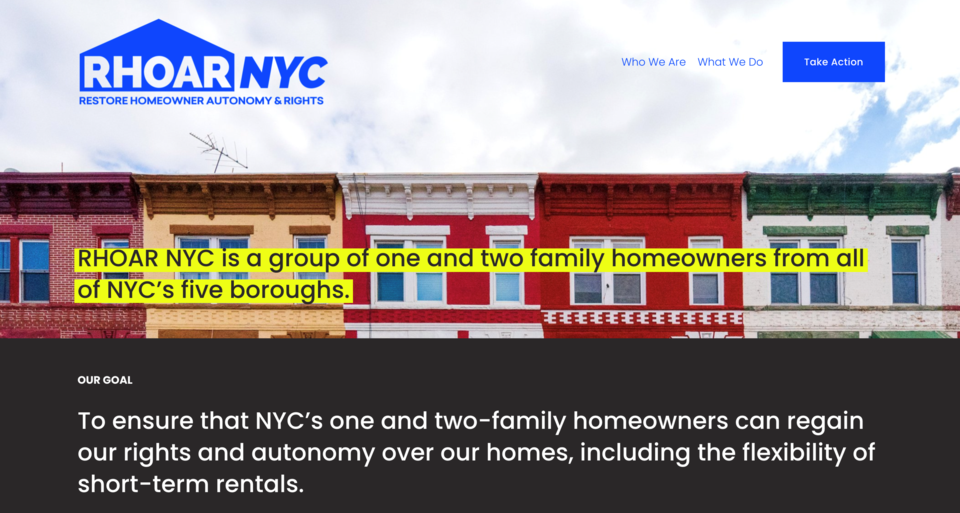Tourists visiting New York City will soon find it harder to book accommodations on home-sharing platforms, as a new Local Law 18 is set to remove over 10,000 short-term Airbnb rental listings from the market.
The law, also known as Short-term Rental Registration, went into effect on March 5. After the latest clash between Airbnb and the city, hosts now have until September 5 of this year to obtain a rental registration number from the Office of Special Enforcement (OSE) to avoid penalties and fines. In a city that never sleeps, the light may go out for many Airbnb hosts.
Previously, the city set a July deadline for Airbnb hosts. However, with those with one- to three-family homes rallying to prevent the city from implementing what one Airbnb host called a “huge, shortsighted mistake,” and Airbnb suing the city for what it called a “de facto ban,” city officials agreed to move the reinforcement date back two months.
However, the city maintains the stance it has no need for home-sharing platforms like Airbnb since hotels are “a well-regulated model that provides comfort and safety for all involved.”
We spoke to the opponents of the law—homeowners whose Airbnb business has been taken off the listing, and whose livelihoods, they say, are negatively affected as a result. We also spoke to the law's supporters, basically the local hotel industry and those with an interest in ensuring its profitability.
“Belong Anywhere with Airbnb”
Sixty-three million people are expected to visit New York City in 2023. This is a number that, according to the leaders of New York City Tourism + Conventions, the tourism authority of the five boroughs, signals a full return to pre–COVID-19 pandemic tourism levels. City blocks that once looked like parts of a ghost town in a seemingly endless health crisis are now, once again, packed with domestic and overseas visitors. “We look forward…to restor[ing] our industry’s economic prosperity and to continue growing the positive impact visitor spending makes across New York City,” said the group’s Chairman Charles Flateman and President and CEO Fred Dixon in a joint statement.
Projected Visitors to NYC in 2023 is at pre-COVID level. Photo: Provided by NYC & Company Report
The long list of those who would benefit from the waves of returning tourists includes private homeowners. Throughout the city, families with extra rooms or apartments have signed up with Airbnb, an online marketplace for short-term homestays. People who stay at Airbnb properties get to experience lesser-known, hidden-gem neighborhoods. Tourists often find accommodations on Airbnb to beat the high price of staying in a hotel.
And while the majority joined the platform well before the pandemic hit, many Airbnb hosts started sharing their homes in the months of 2020; at a time when others were closing their doors to strangers, they opened theirs.
Some said being an Airbnb host during the pandemic was a way to earn extra income. Some said they turned their apartment into short-term Airbnb rentals after their tenants stopped paying rent. Others said it’s a way to bring back business to local neighborhoods, especially after the fallout from COVID.
For Brooklyn musicians Paul and Gia Briscoe, they went to Airbnb when the music scene came to a halt three years ago. Gia admitted it was “a little trepidatious bringing strangers into your home, but it turned out to be one of the best experiences ever.” The couple inherited their 102-year-old house from Gia’s side of the family, and have been renting the extra space in their home to help pay taxes and keep up with the increased cost of living. They said that being an Airbnb host brings in approximately a third of their income.
Eran Tzivon, a Crown Heights homeowner since 2020, said that hosting Airbnb is “a lifesaver with the mortgage, and is bringing nothing but great economic and cultural good vibes to the neighborhood.” He said that guests who came to his place usually shared the same two things: “Thank you for saving us from hotel prices in Manhattan,” and, “We would never be in Brooklyn without this place.”
A Bed-Stuy 2-family homeowner Kate Jordan lost her tenants during COVID because they stopped paying rent. She said that Airbnb saved her family from losing their home.
Mory Traore lost his job during COVID and turned to Airbnb to support his life in NYC. He said his family of five “will be in the streets the moment we stop hosting on Airbnb.”
Their stories are echoed by many voices in the community comment section on the Office of Special Enforcement’s website. Hosts shared that their Airbnb hosting business became a necessity during COVID despite worries about the risk of spreading the virus. Airbnb’s survey on March 16, 2020, showed the numbers: More than half of the hosts surveyed (53%) said their Airbnb income helped them stay in their homes, and about half of hosts surveyed (49%) said they were hosting on Airbnb to help make ends meet.
An Airbnb site. Screenshot made on Airbnb.com
The public comment section, now closed and filtered, has over 200 comments—most of them are testimonials by homeowners, like Jordan, who find the new rule, “a blanket solution that punishes homeowners and forces them to become landlords.” The first public hearing on Short Term Rental Registration lasted over eight hours, with attendees making similar pleas.
New Rule, Tough Stance
The adopted new rule, as per the Office of Special Enforcement's statement, prohibits rentals of less than 30 days for dwelling units, meaning a place used as a home, unless the permanent residents of said units are present during the rental. They must only have no more than two paying guests at a time. Hosts will also need to register their rental with the OSE, including providing the personal information of all permanent residents, a diagram of the rental with normal and emergency exit routes, and proof that the host resides at the listing. After the registration process, the OSE will provide hosts with a registration certificate and number for them to display on all advertisements and offerings.
Additionally, “registration will not be permitted if there are uncorrected violations of law that might imperil occupants of such units, or if the units are in buildings on a prohibited building list,” said the OSE statement, indicating that landlords and co-op boards can register to prevent their tenants from renting out space. The new rule also requires that short-term rentals, or STR, homes have no internal door locks. According to CitySignal, a New York City’s real estate news outlet, these laws are simply a toughened stance that the city is taking, as it “does not change or override previous regulations.”
A superhost named Jenna, whose 3400 square feet Victorian home in Brooklyn is fully booked until the mid-September of this year, said: “The language of the bill, and the behavior of the Mayor’s Office of Special Enforcement, has made the hosting community out to be criminals.” She warns that families will have to sell their homes because they can no longer afford to keep them.
Many hosts were in the process of registering for a number to get ahead of the old July deadline, but many are not even going through the process or are withdrawing their applications. Katerina Metelitsa, a member of a Facebook group called Airbnb NYC whose home has no sprinklers, shared in the forum that it’s “too much stress” to deal with inspections and potential fines. Others are confused by the many different dates being thrown around—some saw May 9th during the application process, others referred to the July 1st “reinforcement” date, and now a September 5 date is thrown into the mix.
Hosts were also frustrated by Airbnb’s silence: Many said they haven’t received any concrete information from Airbnb besides telling them to, “reach out to the Mayor and your Council Member to share why this registration system and restriction will affect your ability to host.”
That was until Airbnb sued the city on June 1, separately but together with three other homeowners.
Airbnb v. NYC
“Housing should be for New Yorkers. Hotels should be for tourists,” said Ben Kallos, a former NYC City Council member who sponsored the bill in 2021.
According to Kallos, every renter in the city had to pay an extra $384 in rent due to the expansion of Airbnb, from 2015 to 2017. “We need every apartment being listed illegally on Airbnb back on the market to help our affordable housing crisis. At a time when hotels are closing or sitting there empty it is crazy to see apartments all over the city getting converted into illegal Airbnbs,” he said.
State Senator Jabari Brisport, whose district includes Bedford-Stuyvesant, testified in support of the new rule during the first public hearing. “We have a hotel model that is thriving in this city. It is a great model. You get someone who makes your bed every day. You get a cute little soap and the workers get union wages. It’s a well-regulated model that provides comfort and safety for all involved, ” he said. Brisport blamed Airbnb for “reduc(ing) housing stock for residents of New York City who need them.”
Short-term rentals of less than 30 days have always been illegal in New York City if the host is not present. The only new aspect of Local Law 18 is that now homeowners are required to register with the city before putting their listing on platforms like Airbnb.
Many other cities have enacted similar measures. In Philadelphia, a law that took effect on Jan. 1 requires short-term hosts to obtain two licenses and a zoning permit before they can resume hosting. In Los Angeles, hosts need to register with the city with their primary residence and can only home-share up to 120 days per calendar year. Boston and San Francisco allow short-term rentals as long as the unit is eligible and the host registers with the city.
New York City has been trying to curb illegal short-term rental activities ever since Airbnb’s entrance over a decade ago. In 2019, as a settlement for a lawsuit filed by NYC, Airbnb agreed to hand over data of more than 17,000 listings. Yet, in 2021, the OSE only managed inspections in 3,017 cases citywide. This means that the majority of STR units were operating with little to no restrictions. With the new rule about to take effect, many hosts are frustrated.
According to an Airbnb representative, hosts who using the OSE registration process are seeing a low acceptance rate, with one out of every 90 applications has been accepted.
“Our hope is that prior to September 5, the City will accept our invitation to work together to find sensible solutions that allow regular New Yorkers to share their home, and that if not, please be assured that we will continue to support Hosts and fight to prevent the elimination of the short-term rental market in New York City.”
With NYC as its largest domestic market, Airbnb is not pulling out. So far, its fight has gained some traction with the lawsuit, but it needs more. A growing group of 300+ hosts banding together as they “regain our rights and autonomy over our homes” might just be the booster it needs in this saga.
Part two of this series will take a look at what Brooklyn hosts think is really behind Local Law 18; whether it’s an effective way out of the housing crisis, and what are the plans, as Sept. 5 approaches.




.png;w=120;h=80;mode=crop)
